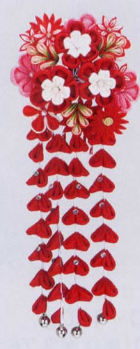Today I learned that 羅府 is ateji for ロサンゼルス (Los Angeles). ![]()
Lots of countries have ateji, also things like sushi, etc. Share your recent ateji discoveries here!
Today I learned that 羅府 is ateji for ロサンゼルス (Los Angeles). ![]()
Lots of countries have ateji, also things like sushi, etc. Share your recent ateji discoveries here!
From the English Wikipedia page for あてじ:
Ateji form of “trash bin” (ゴミ入れ, gomi-ire) as “護美入れ”, using the ateji form of “ゴミ” (trash, gomi). “護美” literally translates as “protect beauty”.
Other North American cities/states with ateji:
紐育 (ニューヨーク)
舎路 (シアトル)
華府 (ワシントン, can be Washington DC or Washington state)
布哇 (ハワイ)
晩香波 (バンクーバー)
柏林 apparently stands for Berlin and 独逸 for germany.
I always liked 珈琲 (コーヒー ![]() )
)
珈 means “ornamental hairpin”, and 琲 means “string of many pearls”, and the reasoning behind it was because the branch of red coffee beans resembles the hair ornaments (かんざし) that Japanese women wear ^^
Ex:
 &
& 
珈琲 ! ![]()
![]()
![]()

For those of us who don’t know what ateji means:
In modern Japanese, ateji (当て字, 宛字 or あてじ “called upon characters”, Japanese: [a̠te̞ʑi]) principally refer to kanji used to phonetically represent native or borrowed words with less regard to the underlying meaning of the characters. This is similar to man’yōgana in Old Japanese. Conversely ateji also refers to kanji used semantically without regard to the readings.
Ateji - Wikipedia
One thing I love about country names and ateji:
米国 = America, so 米語 = American English
英国 = England, so 英語 = British English
豪太剌利 = Australia, so 豪語 = … boastful talk? Sounds about right.
Also, 基督 = キリスト (i.e. Christ)
If there was a reasoning behind the choice of characters, is the word still considered ateji?
Interesting question. I do think they’re still considered ateji, since the reading comes first. Others may disagree with this.
Perhaps ateji is used as a catch-all term for all contemporary kanji words?
露西亜 and 露語 are the only ateji i know
Not really. Just because a word is new/contemporary, doesn’t always mean it originated as reading first. For example 仮想通貨 is a contemporary word because the concept of cryptocurrency has not existed for very long. But it’s definitely not ateji.
Do you know why Kanji was used to represent this particular word, and not katakana?
Probably because the two concepts (virtual + currency) already exist as kanji (仮想 + 通貨, all available on WK). Whereas transliterating “virtual currency” or “cryptocurrency” in katakana would result in cumbersome and long words.
Thanks for the info. I learned something new today! ![]()
I just looked this up and it turns out that 露西亜 is ロシア. It makes sense that Japan has ateji for their neighboring countries.
I saw this made-up ateji in episode 20 of Sakura Quest:
三田 九郎(主?) = Santa Claus
(I wasn’t sure where the す came from, but I think it’s the archaic honorific 主 so you can technically add it to someone’s name even though it isn’t written.)
Ateji can have parts that borrow the reading of characters, the meaning of characters, or both, so yes it’s still ateji
It’s mentioned as ateji in the article you quoted as well ^^
It’s called 義訓 [ぎくん], isn’t it? I think it is considered a form of 当て字.
gikun is reverse ateji.
Ateji uses the reading of the character for a word, while gikun uses the meaning of the character for a word (list).